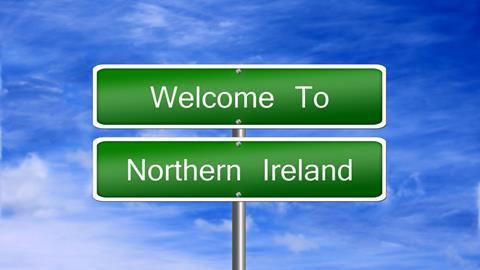The Northern Ireland Assembly came together in a rare moment of concensus this week to call on the UK government to resolve outstanding trade issues between Great Britain and Northern Ireland.
The motion follows a debate on GB-NI trade which was held this week in the Northern Ireland Assembly and included contributions from across the political spectrum in Northern Ireland.
During the debate NI Assembly members repeatedly raised hauliers concerns at the impact Brexit border controls have had on trading between NI and GB.
Phillip Brett, DUP NI Assembly member for North Belfast, said: “The Road Haulage Association have been clear that there has been a 30% drop in the past two years in terms of trade between GB and Northern Ireland.”
He added that an assessment by the NI Department for Economy, published earlier this year, “made clear that the appeal of the Northern Ireland’s unique market access may be limited by the extent to which traders are able to access the UK internal market.
“So this is a problem that faces all members. And yes, we can rehash the old political debates, but let’s all work together to continue the progress that has been achieved and get an outcome that works for everyone here in Northern Ireland.”
DUP NI Assembly member for Foyle, Gary Middleton, added: “I think it is appropriate that we first acknowledge the importance of road hauliers to Northern Ireland. They are the backbone of the economy, maintaining our supply chains across the kingdom and further afield.
“Our domestic business community rely on them for goods, exports and movement of materials. And our customer bases depend on them for imports into our shops and businesses, as already has been stated by my colleague, Philip Brett, purchases by Northern Ireland businesses from GB amounted to some £11bn in 2022 over double that procured from the entirety of the EU.
“This figure alone, coupled with the pivotal role our hauliers play and the movement of goods, requires government to both listen and act on the concerns raised.
“We know that the Road Hauliers Association has been involved in the hauliers technical discussion group alongside HMRC Treasury and the Trader Support Services in an effort to address some of these challenges already outstanding.
“Areas of concern include the lack of HMRC guidance on the movement of parcels due to come into force at the end of the month, problems being encountered with the Trader Support Scheme and the lack of clarity on some products entering Northern Ireland from GB.
“The business community often fear uncertainty the most. This is something that we are all familiar with, and so it is incumbent upon us all to work to reduce uncertainty and address legitimate concerns.”
Timothy Gaston, the Traditional Union Voice NI Assembly member for North Antrim, said that with just two weeks to go before the introduction of the Irish Sea partial border and the Irish Sea green lane customs border on 1 October, hauliers have not been given enough information on many aspects of the new requirements.
He added: “While they have some information, the hauliers remain in the dark on many key questions and process detail in the context of the limited information that has been made available to them.
“Hauliers are particularly disturbed, first about the failure of the government and Trader Support Service to understand that the interaction between The red lane and green lane is generating growing complexity, which is entrenching, rather than removing the sense in which the border is an obstacle.”
He continued: “We are creating the most complex set of customs arrangements anywhere in the world, with global customs processes imposed on a small regional economy relying on just-in-time services to keep business moving.”
He also criticised the administrative burden placed on hauliers. “The government seems to think it can rely on hauliers to extract detailed information from traders moving parcels and negotiating the customs green border, the extraction of which is extraordinarily time consuming and expensive.
“The hauliers point is that if the government wishes to extract large amounts of information with traders, then it is the responsibility of the government to get that information. It is very concerning that some traders have decided to stop trading with Northern Ireland because the data requirements are too burdensome.”
The debate followed on from a series of meetings RHA held recently with MPs and stakeholders in Westminster where the association raised the outstanding issues facing the haulage sector and highlighted the criticality of the industry to overall economic growth.
John Martin, RHA policy lead for Northern Ireland, said: “We welcome the focused debate at Stormont and the fact that through this successful motion, the Assembly acknowledged the importance of the haulage sector to the overall economy.
“The Assembly recognised that the role of our sector is critical to successful trade between Great Britain and Northern Ireland. Crucially, specific concerns raised by our members on the movement of parcels and certain goods from Great Britain to Northern Ireland were acknowledged.”
He added: ”For the economy to thrive, particularly in the manufacturing and agrifood sectors; supporting the road transport sector and protecting the supply-chain is critical taking cognizance that NI sources the vast majority of its goods from GB through well established and embedded supply lines.
“We want to work with decision-makers to get more clarity for our members and to resolve the key issues faced by our industry. In the weeks and months ahead, we’ll continue to engage with MLAs, Ministers, MPs and various stakeholders on all of these matters.”

















